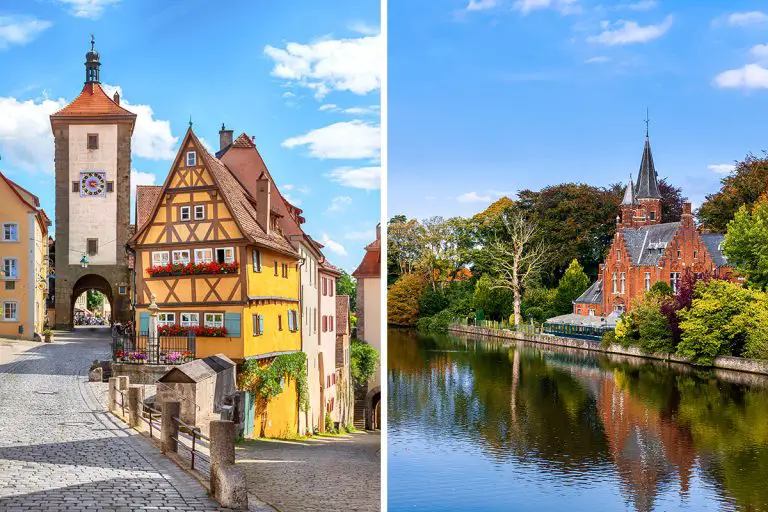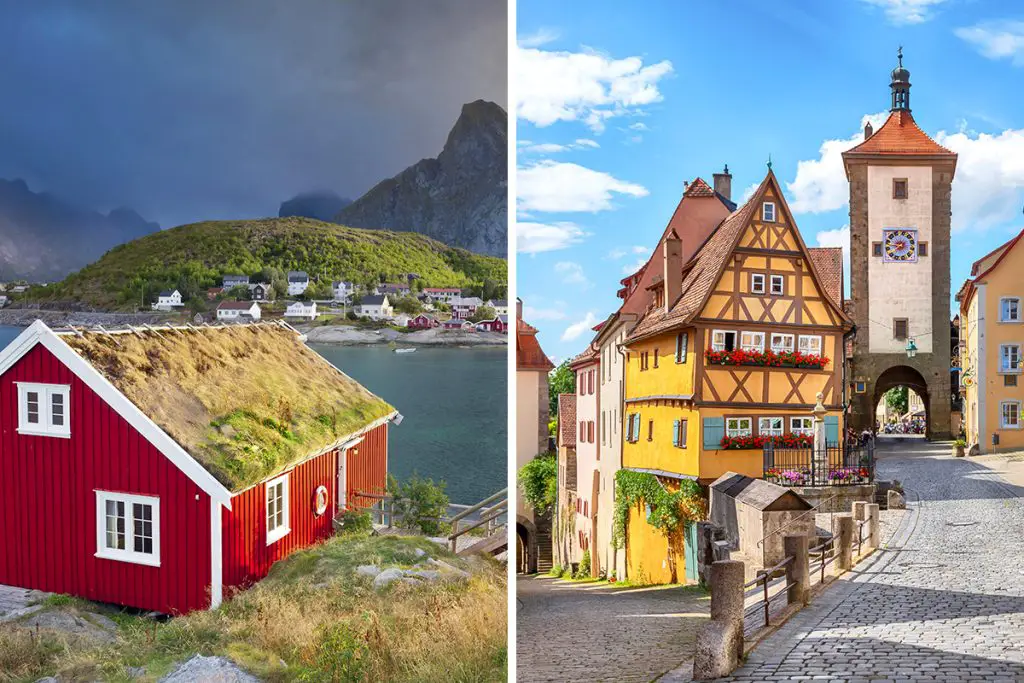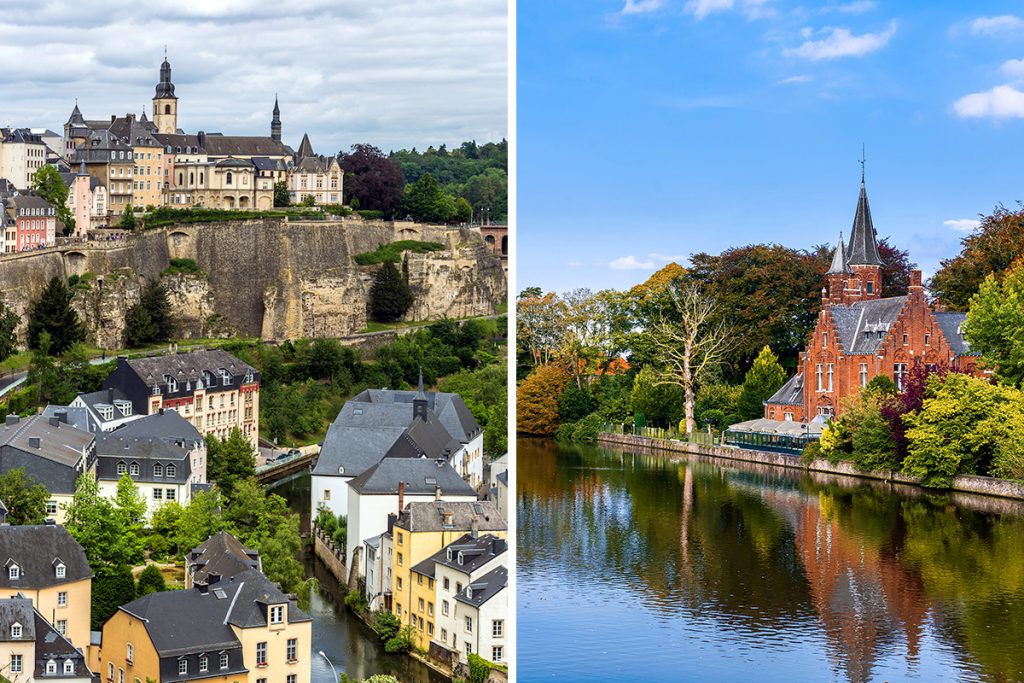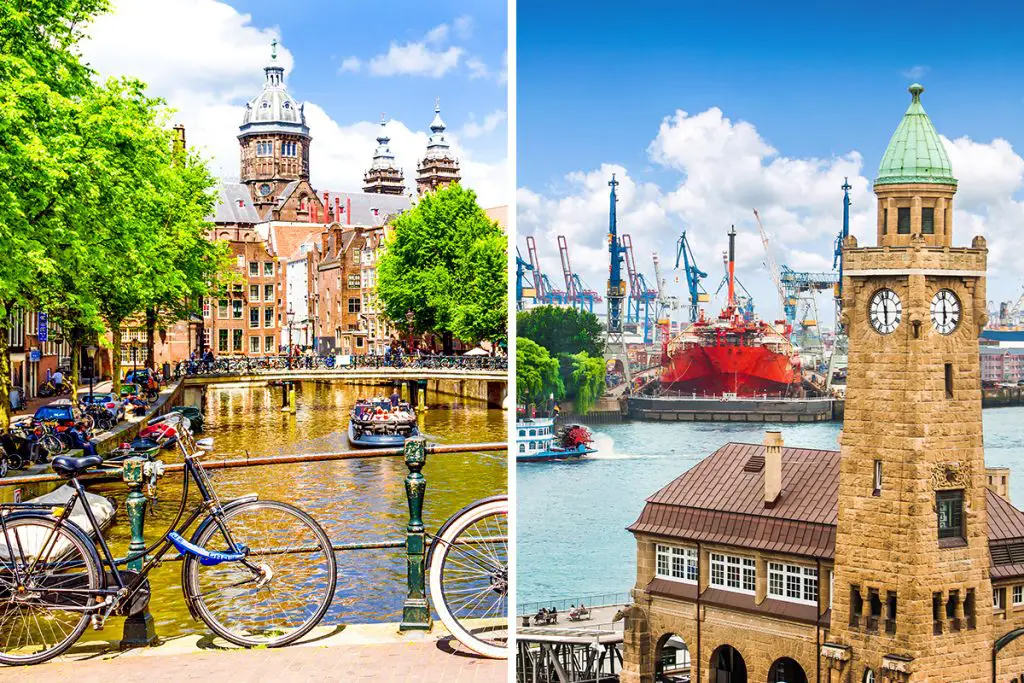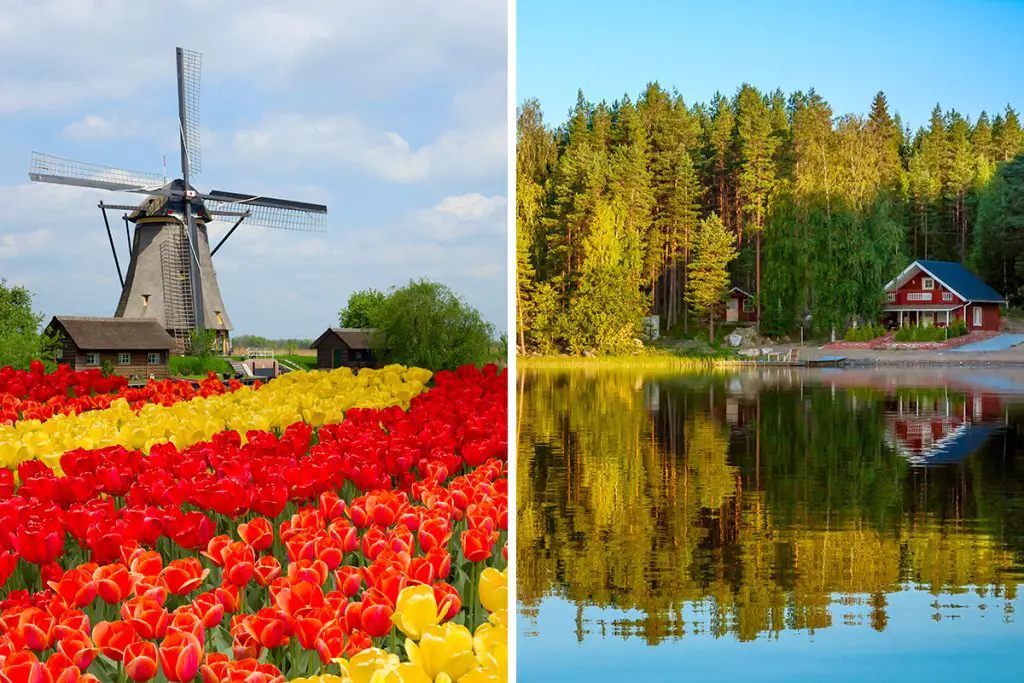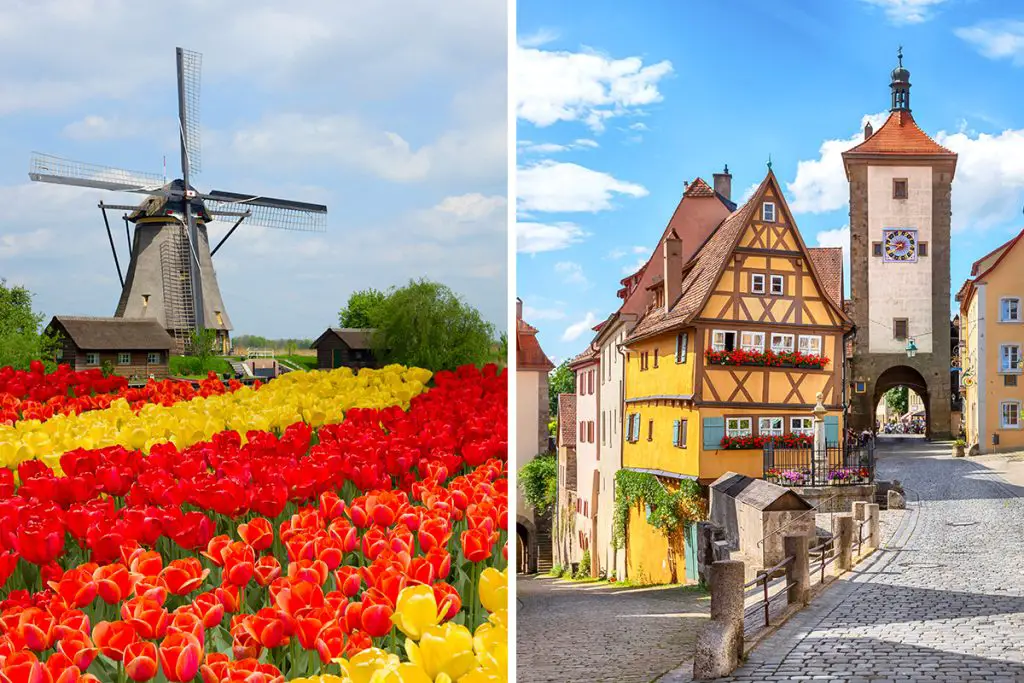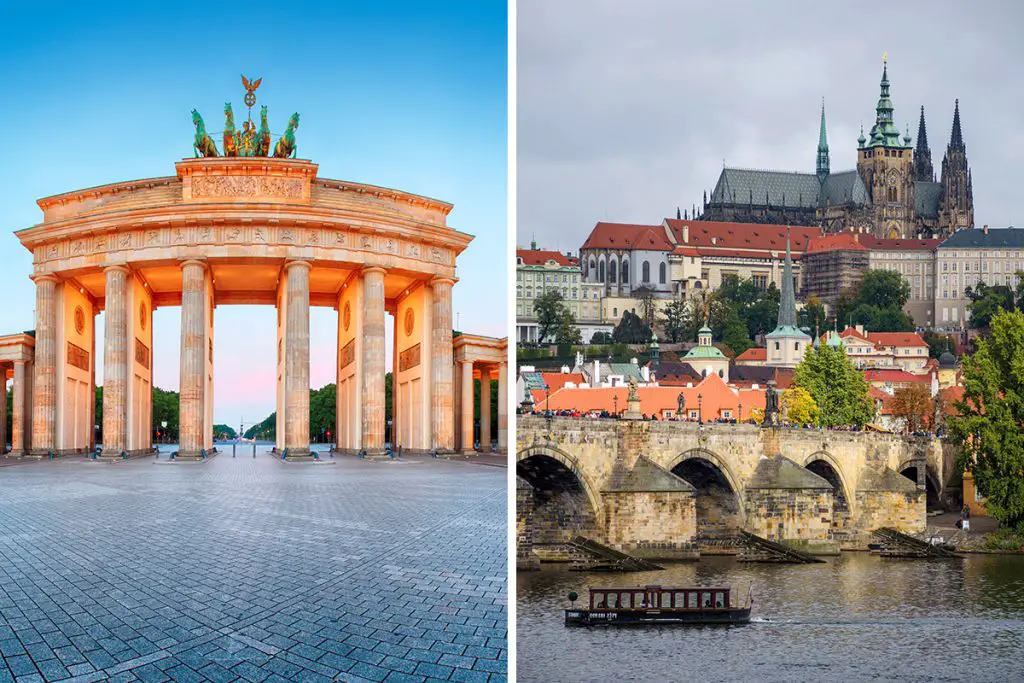Both Germany and Belgium are steeped in history and brimming with cultural delights. They offer a myriad of adventures that could cater to your taste, whether you’re a history buff, an art aficionado, or a nature lover. Excited to find out more? Dive in and explore what each destination has in store for you!
History & Culture
Delving into the rich histories of Germany and Belgium is like embarking on a fascinating journey through time. Both countries have diverse cultures shaped by their unique pasts.
Germany’s history is vast, spanning from the time of the Roman Empire to the modern day. You’ll find this reflected in its culture, from its traditional festivals to its architectural styles. German culture is also heavily influenced by its intellectual history, giving birth to some of the world’s most renowned philosophers, musicians, and scientists.
On the other hand, Belgium’s history, though equally compelling, is distinctly different. Belgium’s past is a tapestry of various cultural influences, from Roman to Spanish to French. This blend has resulted in a unique Belgian culture that celebrates diversity. Belgium is also known for its love for comic strips, being the birthplace of beloved characters like Tintin.
While Germany’s culture is often associated with precision and efficiency, Belgium’s is more laid back and jovial. Both countries, however, share a deep appreciation for the arts and have contributed significantly to various art movements throughout history.
In summary, while both Germany and Belgium boast intriguing histories and vibrant cultures, their expressions are quite distinct. Whether you’re drawn to Germany’s intellectual tradition or Belgium’s multicultural charm, you’re in for a cultural feast!
Attractions & Activities
When it comes to attractions and activities, Germany and Belgium are teeming with possibilities. Whether you’re an adventurer, a history enthusiast, or an art lover, you’re sure to find something that sparks your interest.
In Germany, you can explore grand castles that seem straight out of fairy tales, or immerse yourself in the bustling metropolis of Berlin, where modern architecture stands side by side with historic buildings. If you’re into nature, the scenic beauty of the Black Forest or the stunning Bavarian Alps will leave you in awe.
Belgium, though smaller, packs a punch with its range of attractions. Walk through picturesque medieval towns like Bruges or Ghent, with their well-preserved architecture and charming canals. For art buffs, Belgium’s numerous museums, housing everything from Flemish primitives to modern art, are a must-visit.
If you’re more of an adventurer, Germany’s vast landscapes provide plenty of opportunities for hiking, cycling, and winter sports. Meanwhile, Belgium’s flat landscapes are perfect for leisurely bike rides or canal cruises.
In a nutshell, both Germany and Belgium offer a wealth of attractions and activities. Whether you’re captivated by Germany’s grandeur and diverse landscapes or enchanted by Belgium’s charming towns and rich art scene, you’re guaranteed to have a memorable experience.
Beaches
While neither Germany nor Belgium is primarily known for their beaches, they each offer unique coastal experiences that could add a refreshing touch to your vacation.
Germany’s coasts stretch along the Baltic and North Seas. One of the most notable beaches is Sylt Island, located in the North Sea. Sylt’s beaches are expansive, covering a total length of about 40 kilometers (or 25 miles). The sandy shores and dunes, coupled with its breezy climate, make it a popular spot for wind-based water sports.
In contrast, Belgium’s coastline is shorter, extending approximately 66 kilometers (or 41 miles) along the North Sea. The town of Ostend is particularly popular, boasting a wide sandy beach and a charming promenade. Here, you can enjoy a relaxing day by the sea, with the added bonus of Ostend’s lively city vibe within easy reach.
Summing it up, while Germany’s beaches offer a serene escape with the option of adrenaline-pumping activities, Belgium’s beaches provide a blend of relaxation and urban entertainment.
Eating, Drinking & Nightlife
Diving into the culinary scene is an essential part of any travel experience, and both Germany and Belgium have a lot to offer in this department.
German cuisine is hearty and diverse, with each region having its own specialties. From succulent bratwursts to the iconic pretzels, there’s plenty to delight your taste buds. Germany is also famous for its beer, with hundreds of breweries across the country. A trip to a traditional beer garden is a must-do when in Germany.
Belgian food, on the other hand, is a delightful fusion of French and German cuisine. Known worldwide for its waffles, chocolates, and fries, Belgian dishes are sure to leave you wanting more. And let’s not forget about Belgian beer! With a history dating back hundreds of years, Belgian breweries offer a wide variety of brews to suit any palate.
When it comes to nightlife, both countries have vibrant scenes. Germany’s Berlin is known for its world-class clubs and diverse music scene. Belgium’s Brussels, while more laid-back, offers a mix of trendy bars, pubs, and nightclubs.
In conclusion, whether you’re drawn to the hearty fare and beer culture of Germany, or the sweet treats and laid-back nightlife of Belgium, your taste buds and evening entertainment are well-catered for in both destinations.
Shopping
Shopping can be an integral part of your travel experience. Whether you’re looking for unique souvenirs or high-end luxury items, both Germany and Belgium offer a diverse array of shopping opportunities.
In Germany, shopping is a cultural experience. Cities like Berlin and Munich are packed with a mixture of traditional stores, modern shopping malls, and trendy boutiques. You can find locally made crafts, designer clothes, and world-renowned German engineering in everything from toys to cars.
On the other hand, Belgium offers its own unique shopping experience. Known for its fine chocolates, lace, and diamonds, Belgian shops are a treasure trove of distinctive items. Cities like Brussels and Antwerp are particularly famous for their shopping districts.
Ultimately, whether you prefer the rich variety in Germany’s shopping scene or the unique specialty items of Belgium, both countries have shopping experiences that cater to a range of preferences and budgets.
Accommodation
Choosing the right accommodation can greatly enhance your travel experience. Both Germany and Belgium offer a wide range of options, ensuring that there’s something for everyone.
Germany’s accommodation options range from luxury hotels in major cities to charming guesthouses in smaller towns. You can also find unique options like castle hotels, offering you the chance to live out a fairy-tale experience.
Belgium, too, has a diverse accommodation scene. From grand hotels in Brussels to quaint bed and breakfasts in the countryside, the choices are plentiful. Unique to Belgium are the gîtes, or holiday homes, often set in beautifully renovated old buildings.
In summary, whether you’re looking for luxury, charm, or something a little different, both Germany and Belgium offer a variety of accommodations that can enhance your travel experience.
Family-Friendliness & Children’s Activities
If you’re traveling with your family, you’ll want to consider which destination offers the most child-friendly attractions and activities. Both Germany and Belgium are known for their family-friendly cultures, but they offer different experiences.
Germany is packed with family-friendly activities. Cities like Berlin and Munich have many parks, zoos, and science centers that are sure to entertain kids of all ages. Additionally, Germany is the birthplace of many classic fairy tales, and the country boasts several theme parks and castles where your children can live out their storybook dreams.
On the other hand, Belgium also offers a wealth of family-friendly experiences. From its famous chocolate shops and comic book museums to the Mini-Europe park and the Atomium, Belgium has a lot to keep kids excited and engaged.
In conclusion, both Germany and Belgium offer a wide array of family-friendly activities. Your choice between the two will depend on the specific interests of your family members.
Getting There & Getting Around
Accessibility and transportation are essential factors to consider when planning your trip. Both Germany and Belgium are well-connected and have efficient public transportation systems.
Getting to Germany from most parts of the world is relatively easy. It has several international airports, with Frankfurt Airport being one of the busiest in Europe.
Once you’re in Germany, the country’s extensive railway network and autobahns (highways) make traveling around the country straightforward. The distance from Berlin to Munich is about 600 kilometers (372 miles), which can be covered in about 6 hours by car or 4 hours by high-speed train.
In contrast, Belgium is a smaller country and easier to navigate. Brussels Airport serves as the main international gateway.
Belgium also has an efficient railway system, and since the country is small, you can travel from one end of the country to the other in a few hours. For instance, the distance from Brussels to Antwerp is around 50 kilometers (31 miles), and a train ride between the two cities takes less than an hour.
In summary, whether you prefer the vastness of Germany with its efficient autobahns and railways, or the compact and easily navigable Belgium, both countries offer excellent accessibility and transportation options.
Weather
When planning a trip, it’s important to think about the weather, as it can greatly impact your activities and overall experience. Germany and Belgium, while geographically close, do offer some differences in their climates.
Germany generally experiences a temperate seasonal climate, with moderate to heavy rainfall throughout the year. The winters can get quite chilly, with temperatures often dropping below freezing (32°F or 0°C). Summers in Germany can be warm, with temperatures usually ranging between 68°F to 86°F (20°C to 30°C).
Belgium, in contrast, has a maritime temperate climate. This means that it has mild summers and cool winters. During the summer, you can expect temperatures to hover around 70°F (21°C), while in winter it usually stays above freezing, averaging around 40°F (4°C).
In both Germany and Belgium, the weather can be unpredictable, so it’s always a good idea to check the forecast and pack accordingly. If you love snowy landscapes, a winter trip to Germany might be right up your alley. However, if you prefer milder winters, Belgium might be a better choice.
Safety
Safety is an essential aspect to consider when choosing a travel destination. Both Germany and Belgium are generally considered safe countries to visit, but like anywhere, they have their issues to be aware of.
In Germany, the crime rate is relatively low, but you should still take precautions, particularly in larger cities. Be aware of your surroundings, especially in crowded tourist spots and public transportation, where pickpocketing can occur.
Similarly, Belgium is a safe country for tourists. However, petty crimes like pickpocketing and bag snatching are common in tourist areas and on public transport. Just like in Germany, you should always keep an eye on your belongings.
While both countries have excellent healthcare systems, it’s crucial to have appropriate travel insurance. This can protect you from unexpected costs like medical bills or if you have to cancel your trip.
In conclusion, both Germany and Belgium offer safe travel experiences with some precautions necessary. Always remain vigilant and ensure you’re covered by travel insurance to make your trip as smooth as possible.
Cost
When planning a trip, cost can be a significant factor. It’s important to understand the general expenses you might encounter in Germany and Belgium.
In Germany, the average cost of a hotel room can range from 70 Euros ($84) for a 3-star hotel to 110 Euros ($132) for a 4-star hotel per night. Dining out at a mid-range restaurant could cost around 15 Euros ($18) for a main dish. If you’re planning on using public transportation, a one-way ticket typically costs around 2.80 Euros ($3.36).
In comparison, Belgium’s prices can be slightly higher. A 3-star hotel may cost around 85 Euros ($102) per night, while a 4-star hotel could be around 120 Euros ($144) per night. A meal at a mid-range restaurant might set you back by about 20 Euros ($24), and a one-way ticket for public transportation is typically around 3 Euros ($3.60).
It’s also worth noting that prices can vary depending on the city you’re visiting and the time of year. Prices in major cities like Berlin or Brussels are usually higher, especially during peak tourist season.
Which Is Better – Germany or Belgium?
Choosing between Germany and Belgium can be challenging as both countries offer rich histories, unique cultures, and memorable experiences.
If you’re a history buff, you might lean towards Germany, with its impressive historical monuments and remnants of its influential past. On the other hand, Belgium’s vibrant history and diverse cultural influences also make it a captivating destination.
When it comes to attractions and activities, Germany offers a wider variety, from castles to hiking trails. In contrast, Belgium’s charm lies in its quaint towns, iconic architecture, and museums.
As for beaches, neither Germany nor Belgium is particularly renowned for them. However, if you’re seeking a coastal experience, Belgium’s coastline offers more accessible options.
If you’re a foodie, both countries will delight your taste buds. Belgium is famous for its chocolates and beers, while Germany offers hearty meals and world-renowned beers.
Accommodation and cost-wise, Belgium tends to be slightly more expensive than Germany. However, both countries offer a range of options to suit various budgets.
In conclusion, the choice between Germany and Belgium boils down to your personal preferences. If you’re looking for a more diverse range of attractions and a slightly less expensive trip, Germany might be your best bet. However, if you’re drawn to charming towns and delicious treats and don’t mind a slightly higher cost, Belgium could be your perfect destination.

